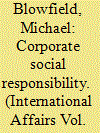| Srl | Item |
| 1 |
ID:
062048


|
|
|
|
|
| Publication |
May 2005.
|
| Summary/Abstract |
Contrasting perspectives of international companies and civil society groups have divided recent debates about corporate responsibility in developing countries. The Corporate Social Responsibility discourse has been promoted by business lobbies, emphasizing the role of international companies in voluntarily contributing towards the solution of pressing social and environmental problems through partnerships with other stakeholders. The notion of corporate accountability has become the rallying point for sustainable development, demanding stricter regulation of corporate behaviour by national governments and the enactment of an international corporate accountability convention. This article assesses the promises and pitfalls of these two competing approaches to industries in South Africa. The article argues that a multi-level approach is necessary to the impact of CSR and corporate accountability initiatives. It concludes that CSR may improve environmental management systems and reduce corporate pollution levels whereas corporate accountability approaches may provide important incentives for companies to improve their environmental performance, assist in the development of national environmental governance frameworks guiding company-community interaction, and facilitate the enforcement of national legislation pertaining to corporate responsibility. However, both approaches fail to address the underlying, globallevel structural causes of conflicts between companies and stakeholders affected by their operations. These conflicts can only be reversed by fundamental changes in the global economy.
|
|
|
|
|
|
|
|
|
|
|
|
|
|
|
|
| 2 |
ID:
062045


|
|
|
|
|
| Publication |
May 2005.
|
| Summary/Abstract |
Corporate Social Responsibility (CSR) has been adopted as an approach to international development. But who does it benefit and in what ways? Most importantly, does it allow certain interest groups to redefine the meaning of international development success?
This article examines the historical relationship between business and development and compares how expectations of business as exemplified through CSR practices differ from those in the past. It then looks at the role and expectations of business in developing countries and proposes two tests for assessing if CSR makes a positive contribution to development goals based on whether it redefines the meaning of good business practice in the interests of the poor and marginalized, and if it helps development practitioners to manage more effectively the possibility and consequences of global capitalism for poor countries.
The article argues that the interests of business are not adequately aligned with those of the poor, and explains why CSR does little to redress this. It argues that the business case in some instances overrides the developmental case for certain actions, and that business thinking is increasingly evident in the policies and practices of international development. Although CSR may have a positive contribution to make in some circumstances, its limitations need to be understood if development's case for involving business is not to be subsumed by business reasons for engaging with (and by-passing) developing countries.
|
|
|
|
|
|
|
|
|
|
|
|
|
|
|
|
| 3 |
ID:
062046


|
|
|
|
|
| Publication |
May 2005.
|
| Summary/Abstract |
Corporate Social Responsibility (CSR) has become a major focus of interest for development practitioners in recent years. While development NGOs have been critical of voluntary corporate initiatives, official development agencies have taken a more positive view and in some cases encouraged CSR. This article locates the growth of CSR in the context of global deregulation since the early 1980s, highlighting the key drivers that have led to its adoption by many leading transnational corporations. It then describes the factors that have led to the recent emphasis given to CSR by both bilateral and multilateral development agencies and the United Nations. A framework for analysing the links between foreign direct investment and poverty is developed focusing on the impacts on the poor as producers, consumers and beneficiaries of government expenditures. This framework is used to illustrate the limitations of CSR in terms of likely impacts on poverty reduction through each of the channels identified and also to point to areas in which CSR may have some positive benefits. Overall, the article concludes that it is unlikely to play the significant role in poverty reduction in development countries that its proponents claim for it.
|
|
|
|
|
|
|
|
|
|
|
|
|
|
|
|
| 4 |
ID:
062047


|
|
|
|
|
| Publication |
May 2005.
|
| Summary/Abstract |
'Manufacturing amnesia' argues that the term 'Corporate Social Responsibility' has been abandoned by most South African firms in favour of the term 'corporate social investment'. This has been done in order to divert attention from calls on business to redress the results of its historical contribution to the apartheid system. The discourse of reconciliation has further served to erase memories of past corporate behaviour. It also masks continuing inequalities and unsustainable practices. Business has responded weakly to the pressures for CSR, of which five broad areas are identified and analysed. Voluntary sustainability initiatives have not succeeded and compliance with black economic empowerment charters and environmental standards have to be legislated and regulated. Firms need to reassess their legacies more honestly until which time their CSR contributions will be regarded as cosmetic and self-serving.
|
|
|
|
|
|
|
|
|
|
|
|
|
|
|
|
| 5 |
ID:
062044


|
|
|